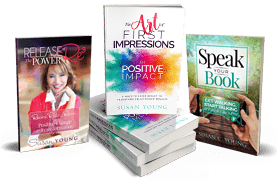
“Emotional intelligence emerges as a much stronger predictor
of who will be most successful, because it is how we handle ourselves in our relationships that determines how well we do once we are in a given job.” ~ Daniel Goleman
“The Art of First Impressions for Positive Impact” is based on the premise that when you become self-aware and learn how to shine bright as your best self, you can transform your relationships in life and in business. Absolutely everything associated with your success is relationship based and emotionally connected.
Developing your emotional awareness will allow you to explore new depths of understanding in yourself and others. It will enlighten as to why people behave as they do and assist you in areas you may wish to improve. All the elements of greater emotional awareness can weave together to ensure you make a positive impact.
The term “Emotional Intelligence” was originally coined by Yale psychologists John D. Mayer and Peter Salve in 1990. Emotional intelligence marks one’s ability to perceive, understand, control, and evaluate their emotions. Ironically, its two founders have differed in opinion as to whether EI is genetic or can be taught. I have built my entire career empowering people with tools such as these.
Haven’t you known people who seem to have a “sixth sense” super power when it comes to connecting, communicating, and understanding? They always know the right thing to say and make us feel like we matter. By the time you finish reading this section, your simple awareness of this concept will make you more emotionally intelligent!
Research has shown that your EQ (Emotional Quotient) is a stronger indicator for your success in life than your IQ (Intelligence Quotient). Your EQ or IQ is your capacity to recognize, discriminate, and label emotions accurately and interpret them to help guide your thinking and behavior.
In his best-selling book, Emotional Intelligence: Why EQ Can Matter More Than IQ, Daniel Goleman shares the five dimensions for being an Emotionally Intelligent person. I have taken the areas of Emotional Intelligence and elaborated from my research and writings. I hope you will recognize the things you are doing right and areas in which you can improve.
1. Self-Awareness:
Your capacity to understand and express your own emotions—you are in touch with your strengths and weaknesses and realize where you might like to make improvements. You trust your instincts and can identify how certain thoughts, feelings, people, and situations make you feel. You are able to hold yourself accountable for your behavior, failures, decisions, and successes.
2. Self-Regulation:
You have developed your ability to keep your emotions and impulses under control. Just as your body has self-regulating mechanisms like perspiring to cool you down and shivering to warm you up, you are able to regulate your emotions according to the circumstances. You abstain from over-reacting, and you know how to set boundaries and how to say ‘no.’ You think before you speak and exercise discretion. You have an ability to manage stress as it happens and remain calm through chaos.
3. Self-Motivation:
You are able to focus your emotions to improve performance and productivity. You know how to light your own fire and sustain your activities to accomplish your goals.
4. Empathy for Others:
You are able to perceive, identify, and understand the wants, needs, emotions, and viewpoints of others. You are excellent at managing relationships, listening, and being sensitive to other’s feelings.
5. Social Skills:
You are able to connect and engage with others easily. You generally like people and are easy to talk to, making you an excellent communicator. Your great collaborative abilities make you an excellent team player and master of relationships. You have a knack for managing disputes and reaching resolutions.
Didn’t it feel good to read the descriptions of your qualities as if you already have achieved a high EQ? If every point resonated, congratulations! You are well on your way to positive and successful impressions!
14 Ways to Be More Emotionally Intelligent
1. Ask yourself, “How am I feeling?”
2. Listen to your gut and tune into your intuition.
3. Connect your thoughts to your feelings to your behaviors.
4. Pay attention to physiological responses and emotional reactions.
5. Observe how you react to other people’s behavior.
6. Write your thoughts and feelings down.
7. Read body language and look for the messages which aren’t being spoken.
8. Try to understand their behavior from a new perspective.
9. Read books, attend seminars, and study positive psychology to increase your EI.
10. Listen without interrupting.
11. Delay gratification by not acting impulsively.
12. Deliberately decide to respond thoughtfully.
13. Practice positivity in thoughts, words, and actions.
14. Learn to give without expecting anything in return.
Un-Impressives
People who lack emotional intelligence, may…
• Become quickly irritated and frustrated when thing don’t go their way.
• Defend their limitations, poor choices, or bad habits.
• Demonstrate narcissism and lack consideration for others.
• Trivialize other people’s emotions and feelings.
• Blame other people for their problems and refuse to accept personal responsibility.
• Jump to conclusions and make judgments before having all of the information.
• Be apathetic, indifferent, or lacking sympathy for others.
• Show an absence of emotion in an emotionally charged environment.
• Focus first on the challenge, rather than the solution.
A person who draws upon emotional intelligence when interacting with others demonstrates a poise and maturity that helps make everyone present feel at ease and supported.
“The Art of First Impressions for Positive Impact” is an upcoming book by Motivational Keynote Speaker and Leadership Trainer Susan Young. Susan runs the speaking and training firm, Susan Young International. She helps organizations leverage the power of change to improve positivity and performance so they may THRIVE, PROSPER & SUCCEED. With a Master’s Degree in Human Performance, she is writing books and a series of tools to help people MOVE FROM TRANSITION TO TRANSFORMATION. As a result of her work, people share how motivated they are to shed what is holding them back and reach a new level of potential to live a life they love. To hire Susan for your next event, please visit www.susancyoung.com.






